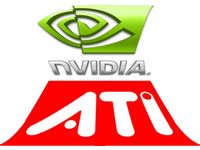Nvidia Settles Price Fixing Lawsuit
A recent major class action lawsuit that was brought against both Nvidia and ATI for conspiring to fix, raise, maintain and stabilize prices of graphics processing chips and cards may soon be coming to a resolution.
According to a 8-K form filed on 24 September, Nvidia has put forth a settlement agreement to resolve the class action lawsuit brought against it and ATI. The settlement would have both ATI and Nvidia each paying $850,000 to the certified class, for a combined $1.7 million. While that agreement is still subject to court approval, a second settlement agreement has already been agreed to by the remaining individual indirect purchaser plaintiffs in the action. It would seem $112,500 is to be paid “in exchange for a dismissal of all claims and appeals related to the Action raised by the individual indirect purchaser plaintiffs.”
The class action lawsuit against both Nvidia and ATI was filed in late August of this year, by plaintiffs Jordan Walker and Michael Bensingor. According to the plaintiffs, Nvidia and ATI allegedly violated federal antitrust laws by conspiring “to fix, raise, maintain and stabilize prices of graphics processing chips and cards.” As well, the plaintiffs contended that both Nvidia and ATI were unlawfully colluding “to coordinate new product introductions.” The plaintiffs were seeking “triple damages, attorney fees and the costs under the federal antitrust laws.” The certified class is limited to “all individuals and entities who purchased graphics processing card products online from the defendants’ websites in the United States during the period from December 4, 2002 to November 7, 2007.”
According to the lawsuit, ATI and Nvidia had denied the allegations. Back in earlier September though, Tom’s Hardware obtained exhibit documents that showed alleged conspiring between top executives and managers of ATI and Nvidia. One of the documents showed an alleged email conversation between Dan Vivoli of Nvidia and Dave Orton of ATI, in which Dan wrote:
"I really think we should work harder together on the marketing front. As you and I have talked about, even though we are competitors, we have the common goal of making our category a well positioned, respected playing field. $5 and $8 stocks are the result of no respect."
Without admitting any wrong doing, it would appear ATI and Nvidia have avoided a possibly nasty legal case in which a potential guilty verdict may have been found. A settlement does not admit guilt, as a quick settlement could be beneficial even for an innocent party, though it still raises some suspicion. By agreeing to a settlement, it would seem ATI and Nvidia have chosen not to challenge the accusations made against them.
At this time, it’s still uncertain how affected consumers will be able to get a slice of the $1.7 million pool.
Get Tom's Hardware's best news and in-depth reviews, straight to your inbox.
-
starhoof well well, just when you think everything is competition between ATI and NVIDIA something like this comes up.....Reply
what a dissapointment -
falchard Sweet, does this mean I get 1~3 times as much as I paid for video cards in that timeframe? For me thats over $1000Reply -
snarfies1 spaztic7How about anyone who bought a card between those years get some moneies back!Reply
What usually happens with these class action settlements is that the lawyers get 90% of the settlement, and the end consumers get 10%-off coupons for the next Nvidia and/or ATI purchase. Feh. -
Thats All people do is wine and cry, in my opinion the prices are very good and the prices keep falling. We can only benefit from this "price fixing".Reply
-
pug_s I just got a Geforce 9600 GSO for $36 after rebate. Compared to processors, video cards are pretty affordable. This lawsuit is kind of dumb.Reply -
SatansCradleThats All people do is wine and cry, in my opinion the prices are very good and the prices keep falling. We can only benefit from this "price fixing".Reply
Are you stupid or something? "price fixing" is meant to thwart the dropping of prices due to competition. When both sides agree to settling their prices, their is "no" competitive pricing which means you are being screwed over and paying more. -
Pei-chen Nice, 1.7 million fines. It means I can get about $0.75 as one of the millions of people who bought a video card during the aforementioned time frame.Reply -
rocky1234 this is simply to funny to not comment on someone thinks they paid to much for a video card so they dig up some dirt & file a suit in court. So who gets all this money that they won. If its these 2 guys then they just were in it for the money if they are gonna share the wealth with others involved that's not as bad but still pretty stupid.Reply
I bought 3 cards in that time from 2 ATI's & 1 Nvidia all were in the 650 to $750 range wheres my money I want some back too...lol. No just kidding on that. If these guys were selling or buying cards at those prices then its their fault that they paid what they did & its time for them to suck it up & deal with it like grown adults not whinny badies.
If Nvida & ATI did what they said & tried to prove then have the gov fine them big slap their wrists & go on from there. I do not think these guys deserve this kind of pay back because all this is gonna do is open a big can of worms for more law suits files against Novidia & ATI & all that is gonna do is drive the prices up for everyone else so they can cover all the money lost to stupid people who nothing better to other than whack it & dial some greedy lawyer.
